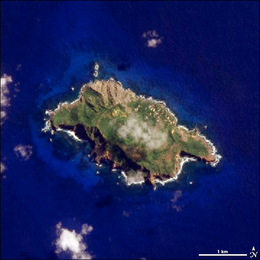Pitcairn Island
 Satellite image | |
| Geography | |
|---|---|
| Location | Pacific Ocean |
| Coordinates | 25°04′00″S 130°06′24″W / 25.06667°S 130.10667°W |
| Archipelago | Pitcairn Islands |
| Area | 4.5 km2 (1.7 sq mi) |
| Length | 3.5 km (2.17 mi) |
| Width | 1.8 km (1.12 mi) |
| Highest elevation | 346 m (1135 ft) |
| Highest point | Pawala Valley Ridge |
| Administration | |
United Kingdom | |
| Demographics | |
| Population | 40 (2024) |
| Pop. density | 10/km2 (30/sq mi) |
Pitcairn Island is the only inhabited island of the Pitcairn Islands, in the southern Pacific Ocean, of which many inhabitants are descendants of mutineers of HMS Bounty.[1]
Geography
[edit]The island is of volcanic origin, with a rugged cliff coastline. Unlike many other South Pacific islands, it is not surrounded by coral reefs that protect the coast. The only access to the island is via a small pier on Bounty Bay. Adamstown is the sole settlement.
Pawala Valley Ridge is the island's highest point at 346 m above sea level.
The volcanic soil and tropical climate with abundant rainfall make the soil productive.
The average temperature ranges from 19 to 24°C. The annual rainfall is 1,800 mm.[citation needed]
Fauna
[edit]Indigenous fauna consists of insects and lizards. Since their introduction, rats have become an invasive species.
A large number of seabirds nest along the steep shorelines.[2]
As coral reefs are absent, fishing is offshore. Sharks, sea bream, barracudas and tuna are all abundant. Whale migrations are seen yearly.
History and population
[edit]Gallery
[edit]-
Church
-
Longboats
-
View of Adamstown
-
John Adams's grave
-
Pier
-
St Paul’s Point (east coast)
-
Indigenous vegetation at Garnets Ridge
-
Southwest
-
St Paul’s pool
See also
[edit]References
[edit]- ^ Johnson, Christine (2014). "The Identity of Place: Pitcairn Island in Cultural and Historical Geography". University of Nevada, Reno. hdl:11714/2838. Retrieved 15 June 2022.
- ^ Albert, Donald Patrick (3 July 2018). "Did or Could Seabirds "Halo" Pitcairn Island for Fletcher Christian?". Terrae Incognitae. 50 (2): 99–114. doi:10.1080/00822884.2018.1498638. ISSN 0082-2884.











